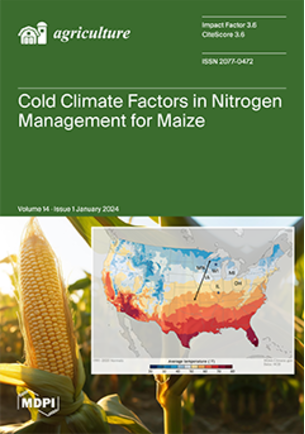Altering Microbial Communities in Substrate to Stimulate the Growth of Healthy Button Mushrooms
Q2 Agricultural and Biological Sciences
引用次数: 0
Abstract
Green mould, caused by Trichoderma aggressivum, is one of the major fungal diseases of button mushrooms. The main problems in chemical disease control include a lack of effective agents, the occurrence of pathogen resistance to pesticides, and the harmful impact on the environment. In an attempt to find a solution, the interaction between two beneficial microorganisms, Bacillus amyloliquefaciens B-241 (an antifungal agent) and Streptomyces flavovirens A06 (a yield stimulant), was investigated in vivo. The synergy factor (SF) was calculated as a ratio between the observed and expected impact on the yield or efficacy of disease suppression after artificial inoculation with T. aggressivum. The highest control of T. aggressivum was achieved by joint application of the two beneficial microorganisms. The additive interaction between microorganisms in efficacy against the pathogen was revealed. The largest yield was obtained in mushroom beds sprayed with the two beneficial microorganisms combined (B-241 80% and A06 20%). Regarding the impact on the yield, synergistic interaction between the two microorganisms was confirmed (SFs were 1.62 or 1.52). The introduction of optimized microbial combinations could create new possibilities for biorational edible mushroom protection, with improved yield and quality and reduced risks to human health and the environment.改变基质中的微生物群落以促进健康牛肝菌的生长
由侵袭性毛霉(Trichoderma aggressivum)引起的绿霉病是金针菇的主要真菌病害之一。化学防治病害的主要问题包括缺乏有效药剂、病原体对杀虫剂产生抗药性以及对环境的有害影响。为了找到解决方案,我们对两种有益微生物--淀粉芽孢杆菌 B-241(一种抗真菌剂)和黄链霉菌 A06(一种增产剂)--之间的相互作用进行了活体研究。协同增效因子(SF)的计算方法是,在人工接种侵染性酵母菌后,观察到的与预期的对产量或病害抑制效果的影响之间的比率。联合使用两种有益微生物对侵染性褐斑病的控制效果最好。结果表明,微生物之间的相加作用对病原体有抑制作用。喷洒两种有益微生物(B-241 80% 和 A06 20%)的蘑菇床产量最高。关于对产量的影响,两种微生物之间的协同作用得到了证实(SFs 为 1.62 或 1.52)。引入优化的微生物组合可为食用菌生物保护创造新的可能性,提高产量和质量,降低对人类健康和环境的风险。
本文章由计算机程序翻译,如有差异,请以英文原文为准。
求助全文
约1分钟内获得全文
求助全文
来源期刊

Agriculture
Agricultural and Biological Sciences-Horticulture
CiteScore
1.90
自引率
0.00%
发文量
4
审稿时长
11 weeks
期刊介绍:
The Agriculture (Poľnohospodárstvo) is a peer-reviewed international journal that publishes mainly original research papers. The journal examines various aspects of research and is devoted to the publication of papers dealing with the following subjects: plant nutrition, protection, breeding, genetics and biotechnology, quality of plant products, grassland, mountain agriculture and environment, soil science and conservation, mechanization and economics of plant production and other spheres of plant science. Journal is published 4 times per year.
 求助内容:
求助内容: 应助结果提醒方式:
应助结果提醒方式:


